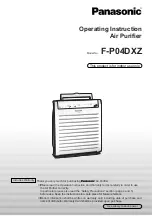
3
|
Specific installer safety instructions
Installer reference guide
17
3(A)MXM+3(A)MXF+4MXM+5MXM
R32 Split series
4P600463-1C – 2020.08
WARNING
▪
Only use R32 as refrigerant. Other substances may cause explosions and
accidents.
▪
R32 contains fluorinated greenhouse gases. Its global warming potential (GWP)
value is 675. Do NOT vent these gases into the atmosphere.
▪
When charging refrigerant, ALWAYS use protective gloves and safety glasses.
CAUTION
▪
Do NOT use mineral oil on flared part.
▪
Do NOT reuse piping from previous installations.
▪
NEVER install a drier to this R32 unit to guarantee its lifetime. The drying material
may dissolve and damage the system.
CAUTION
▪
Use the flare nut fixed to the unit.
▪
To prevent gas leakage, apply refrigeration oil only to the inside of the flare. Use
refrigeration oil for R32.
▪
Do NOT reuse joints.
WARNING
Connect the refrigerant piping securely before running the compressor. If the
refrigerant piping is NOT connected and the stop valve is open when the compressor
is run, air will be sucked in. This will cause abnormal pressure in the refrigeration
cycle, which may result in equipment damage and even injury.
CAUTION
▪
Incomplete flaring may cause refrigerant gas leakage.
▪
Do NOT re-use flares. Use new flares to prevent refrigerant gas leakage.
▪
Use flare nuts that are included with the unit. Using different flare nuts may
cause refrigerant gas leakage.
Charging refrigerant (see
)
WARNING
The refrigerant inside the unit is mildly flammable, but normally does NOT leak. If the
refrigerant leaks in the room and comes in contact with fire from a burner, a heater,
or a cooker, this may result in fire, or the formation of a harmful gas.
Turn off any combustible heating devices, ventilate the room, and contact the dealer
where you purchased the unit.
Do NOT use the unit until a service person confirms that the part from which the
refrigerant leaked has been repaired.
WARNING
NEVER directly touch any accidental leaking refrigerant. This could result in severe
wounds caused by frostbite.
















































